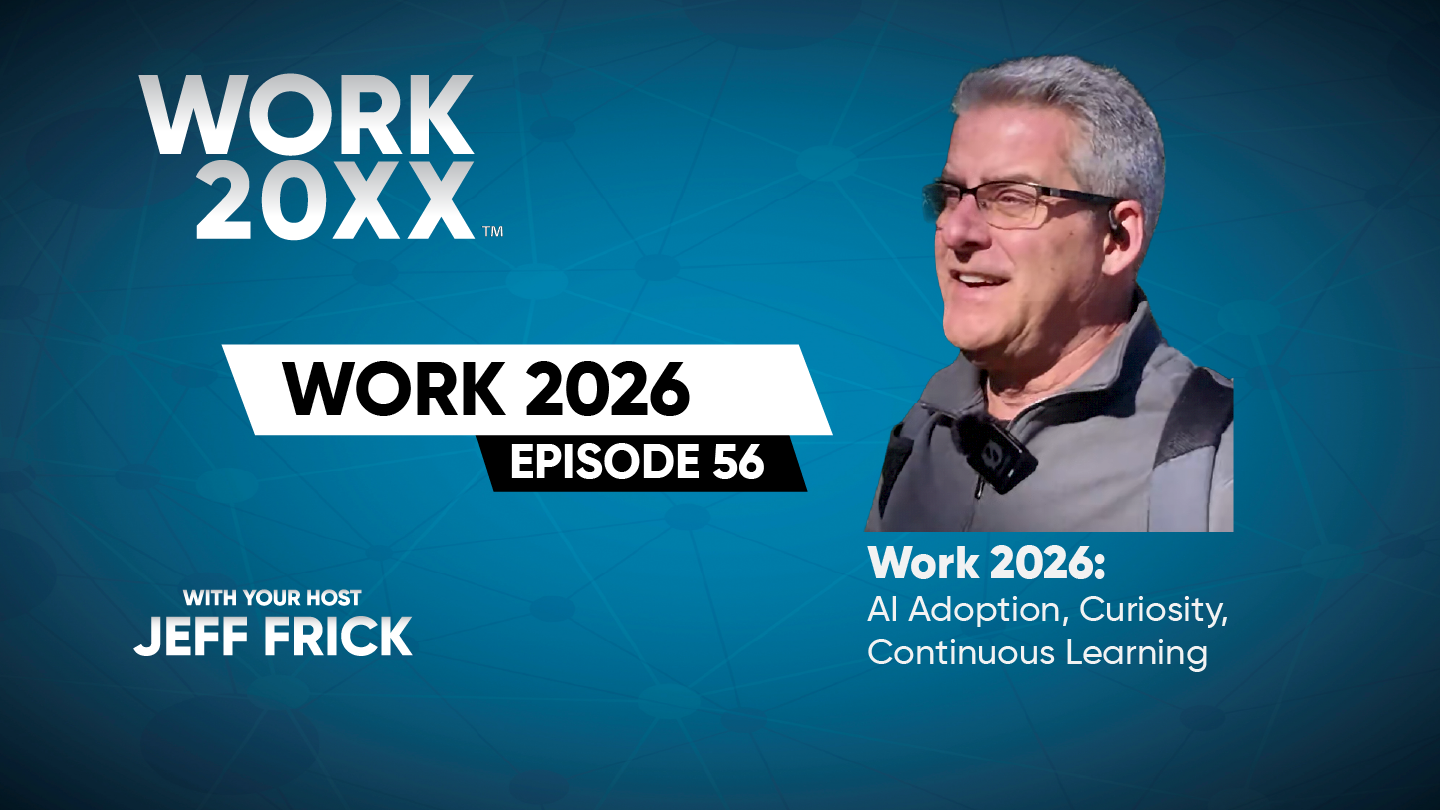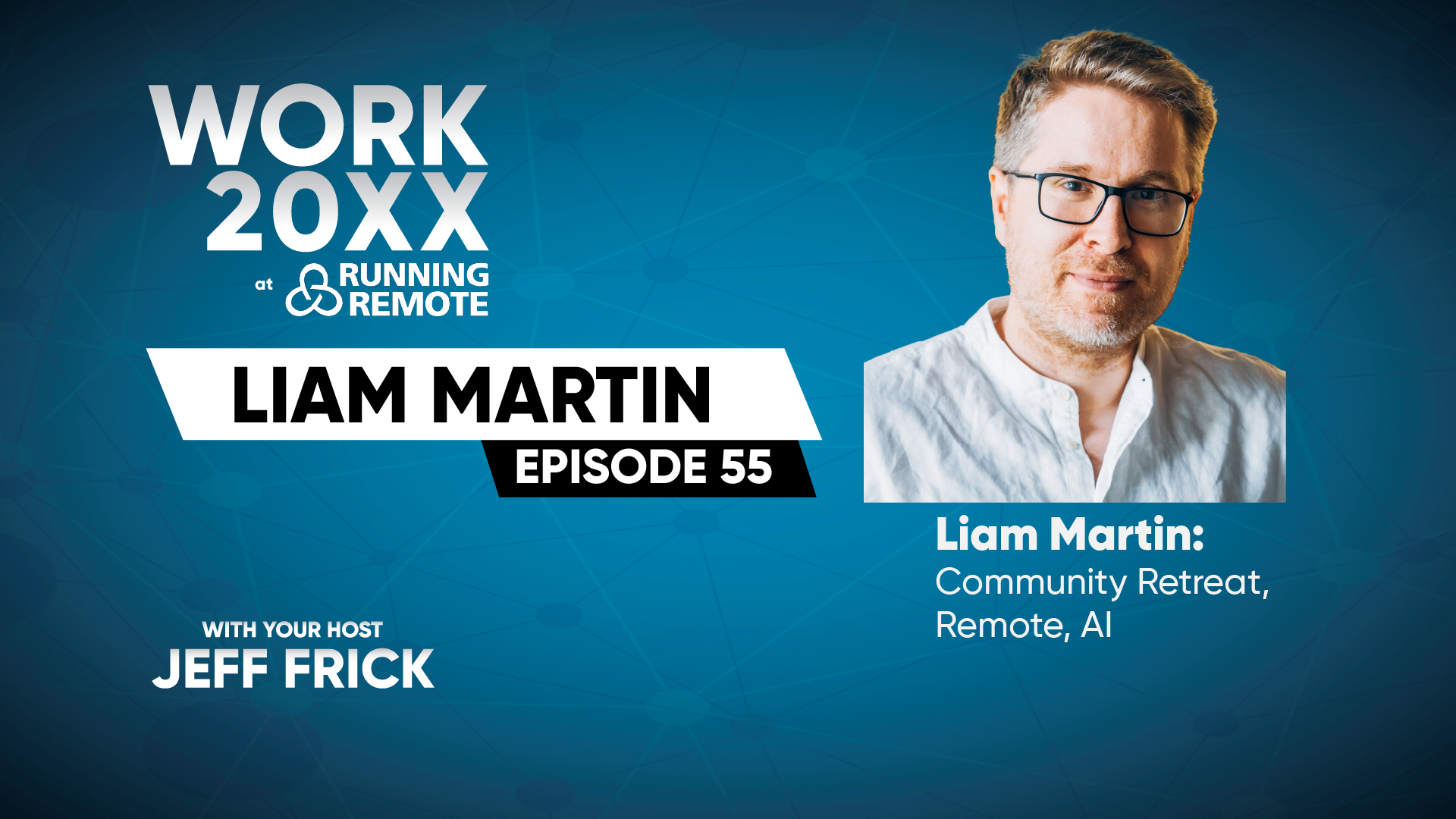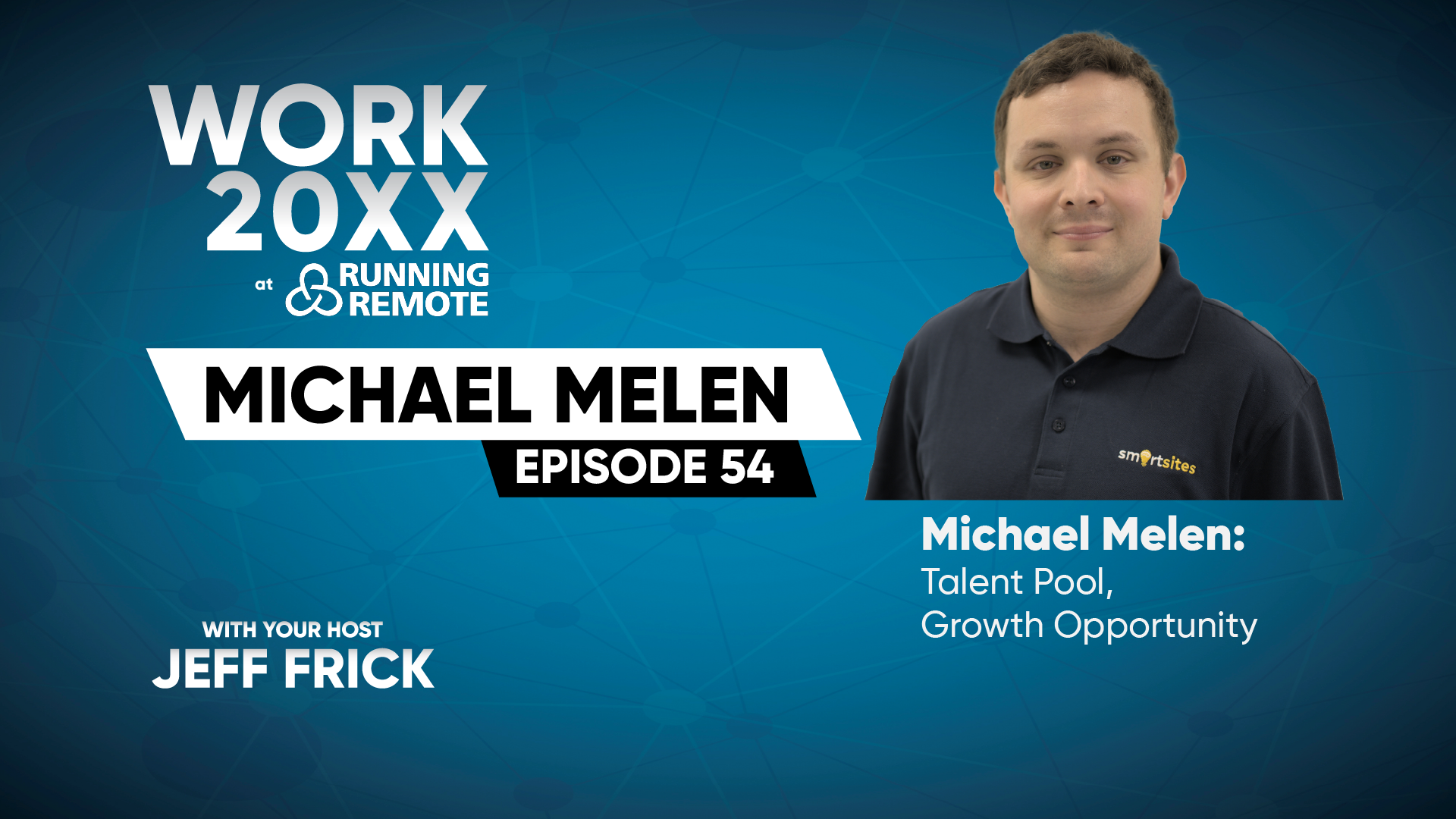Justin Harlan: Move for $10K, Stay for Community | Work 20XX Ep47

Justin Harlan: Move for $10K, Stay for Community | Work 20XX Ep47
Not only are you going to have a lower cost of living, but that that's going to open up a higher quality of life which just makes you a better and more complete human being as a whole. People get more time back and they get more money. They are able to do things that they may not be able to do in other cities. Like open businesses, get involved in boards, contribute to the community. And we really see that coming to life in awesome ways with Tulsa Remote. - Justin Harlan
Justin Harlan wants you to move to Tulsa. But not just for the $10,000 check. He wants you to consider building your life in Tulsa. As Managing Director of Tulsa Remote, Justin leads a groundbreaking initiative to attract talented, remote workers to diversity Tulsa’s economic base beyond oil and gas with more knowledge workers. To grow greater Tulsa, as well as the newly transplanted community.
Tulsa is also investing in ‘placemaking’ to increase the probability that these newest residents will stay for the long team. And it’s working. With over 3,500 people relocated and an 85% retention rate, Justin and team are hitting the right levers.
People are coming for the incentives, they’re staying for the quality of life.
Please join me in welcoming Justin Harlan to the Work 20XX podcast.
And thanks Justin and Austin Remote for being active sponsors of Running Remote, hosting the welcome reception.
Recorded 2025-April-29 at the Running Remote conference in Austin, Texas.
Special thanks to the Tulsa Remote team and our friends at Running Remote.
Justin Harlan: $10K to Move, Stay for Community | Work 20XX podcast with Jeff Frick Ep47 from Running Remote
Episode Transcript
Justin Harlan: Move for $10K, Stay for Community | Work 20XX with Jeff Frick Ep47 from Running Remote
English Transcript
© Copyright 2025 Menlo Creek Media, LLC, All Rights Reserved
Cold Open:
All right
So then I will
count us down
and we will go
in three, two, one.
Jeff Frick:
Hey welcome back everybody. Jeff Frick here, coming to you from Austin, Texas. Not in the home studio today. Work 20XX is on the road. We're excited to come down here and visit with our friends at Running Remote because as we learned from Darren Murph a long time ago. All remote companies do things that all companies should be good at. So whether you're all remote, hybrid, distributed or whatever this is, all are great lessons that you can put into play and improve your communications, efficiency, etc. and we're excited to have our next guest. He's Justin Harlan, the Managing Director of Tulsa Remote Justin, great to see you.
Justin Harlan:
Yeah, thanks for having me.
Jeff Frick:
Thank you, and thanks for hosting last night. Nice little opening cocktail reception.
Justin Harlan:
Oh Sure. Yeah, it was a good time.
Jeff Frick:
So I have to admit, I was a little confused. I saw the flags I wasn't super familiar with Tulsa Remote. And I'm like, I think we're in Austin and there’s signs all over the place here for Tulsa and it's not like a cool name at a local company. It's actually Tulsa, Oklahoma. So for people who aren't familiar, give them a little 101 on what is Tulsa Remote all about?
Justin Harlan:
Sure, well, we started a program back in 2019, really in an effort to diversify our labor labor workforce in Tulsa, Oklahoma. An industry or a city that is often reliant on oil and gas as an industry. And really we're looking for knowledge workers to come to the city and you know help us just be ready for the future. And so we extended an offer which was really unique at the time, which was $10,000 cash.
Jeff Frick:
What year did you start it?
Justin Harlan:
2019.
Jeff Frick:
Okay.
Justin Harlan:
$10,000 cash for you to come and do your remote job in Tulsa for a year. And we just were really placing a bet that if we could get people to the city, they would fall in love with the city and stick around. And certainly had no idea how big it would get or how fast it would get this big. But started out small with about 70 people that came in 2019 and we you know, have a lot of community integration strategies that help people get plugged into the community. And then obviously the pandemic happened and we just grew like crazy. We just, celebrated our 3,500-th member that's moved to the city. And there's a ton of gain both economically and for the community that has come from the program, so.
Jeff Frick:
So looking back to 2019, if you started it, somebody was thinking about it a little bit earlier than that. Why? Where did it even come from? Because, you know, clearly once Covid hit it was a different, different game. But 2019, 2018 it wasn't obvious that that remote work as kind of a category was super special or going to explode.
Justin Harlan:
Really primarily for knowledge workers. At the time that it was just a good percentage of folks that were actually working remotely that were knowledge workers
Jeff Frick:
Right. That's great. So Covid hits and time passes and suddenly there's like all these countries actually that are having kind of remote work visas that are making it easy for people to go work in Portugal or wherever. All these places are. I, you know, there's not as much talk or maybe I haven't been paying attention in terms of you don't have to go overseas, you can do that. And there's a really unique opportunity here in Tulsa. How are you getting your message out? Where are some of these people coming from? How are they hearing about the program?
Justin Harlan:
Yeah, well there are a number of programs like this in the States now. There's actually about 70 that have replicated what we've done. You can actually go to MakeMyMove.com and it's a company that has really leaned into the idea that you know tech talent especially doesn't only belong on the coasts and that you can really find a higher quality of life in the heartland and still even in that get better at what you're doing at work and more productive because you're more satisfied as a human being, so So, there are a number of programs that have kind of replicated what we've done, even stateside.
Jeff Frick:
How did you even think that this was going to happen? Just because they were out there? Or did you do some survey or you just knew that that this is this has got to grow?
Justin Harlan:
Yeah, well, I mean, to me it's really a belief in Tulsa. Yeah. That there's not there's not a lot of folks that are, you know aware of what's happening in Tulsa. And so especially if we could reach the folks that are maybe paying twice as much for a smaller apartment that are living in L.A. or New York or Austin and show them what the quality of life looks like and also invite them to be part of a community in a job that is often very isolated as a remote worker we really believe that that would speak to people that not only are you going to have a a lower cost of living, but that that's going to open up a higher quality of life which just makes you, you know a better and more complete human being as a whole. And in Tulsa, we often see that there’s people who get more time back and they also get more money. And when I When you nurture that environment and really provide that opportunity for people, then they are able to do things that they may not be able to do in other cities. Like open businesses, get involved in boards, contribute to the community. And we really see that coming to life in awesome ways with Tulsa Remote Right.
Jeff Frick
That's cool. So you said there's an application process. There's money that changes hands. So, what's kind of the application process? What are you what are you looking for? Is it a a big gate? Is it limited slots? Is there anything specific that that you prefer or don't prefer? What's kind of the application process?
Justin Harlan:
We try to make it really easy on people. The application should take you about 15 minutes. You do that online. We then go through an interview process if you get to that stage and then if you do get in, we pay for you to come and visit. So up to $500 in reimbursement. We do a couple days worth of programing every month where you can come and see the city kind of test drive it before you decide whether you want to move. And then from the day you get in you have a year to move to Tulsa. We look for people that are going to contribute to the economy. So we really look for folks that are going to bring a good salary with them. Our average salary is about $100,000, but our floor is is much lower than that. We also look for very specific types of jobs, so those that are not just going to duplicate what we already have in Tulsa but be additive to the economy. And then we look for folks that are going to contribute to the community. So, you know, you have a track record of plugging into the community you’re coming from you've thought about Tulsa and how you're going to get involved. And ultimately, we're really looking for people that are going to, you know, be open to the idea of sticking around for a little while.
Jeff Frick:
Right. So do you have X number of seats per year something like that that you've just got money for or no?
Justin Harlan:
We don't, no. We’re privately funded and really excited about, you know, whoever takes us up on this offer. And if we can find the right folks that are meeting all those qualifications we’re you know, excited to help you come.
Jeff Frick:
That's cool. Talk a little bit about the founding you know the funding I think its private individual or foundation behind it. Who or what organization is behind it and why did they decide to take this step?
Justin Harlan:
Yeah, it's the George Kaiser Family Foundation and they really started their efforts as a foundation in early childhood education with the idea that no matter where you're born in Tulsa you should have the same opportunity. And I think what they learned through starting in education is that there's a lot more factors that go into somebody's life outcomes outside of just education. How is the family life at home? Criminal justice, food security. And so they've slowly started kind of building building blocks around that core function of early childhood education. And one of the things they've really invested in over the last ten years is placemaking making Tulsa a place that people want to be and want to come and visit and want to live and then building up some economic development programs around the place that people want to be now. programs around the place that people want to be now. And I think it's really, you know, almost kind of serendipitous because I believe when I moved to Tulsa 20 years ago it was a completely different city. I don't think Tulsa Remote would have worked 20 years ago because it just wasn't the same city that it is today. And so it kind of takes all of those pieces working in tandem to make it an attractive place that people would even come if you're paying them to move there. So it's really an amazing, you know, conglomeration of a lot of efforts over the last couple of decades.
Jeff Frick:
So what's happened with the people that have done it? Both some of the earlier people and some of the later people, how many are stayed? Do they stay and stay in their job? Do they stay and swap jobs? Do they create new things? What's, how's the community kind of developed? 3,500 people That’s a lot of people.
Justin Harlan:
Sure. So we know that anyone that's moved there since 2019, about 75% of them are still around Tulsa today.
Jeff Frick:
75%?
Justin Harlan:
75%. A couple of economic stats that are awesome. For every two people that we pay to move there's an additional person that comes. So in a city like Tulsa that's about 400,000 people. We know that we're responsible for about 5,000 people moving to the city. So that obviously helps a ton with net migration and just growing the city as a whole. Increasing tax dollars last calendar year alone we contributed over $600 million to the economy. And we know that for every dollar that we're spending on the incentive, there's about a $13 return on that investment to the community. on that investment to the community. And then we do know that our folks bring an entrepreneurial spirit about 1 in 5 people is has either started a business or a nonprofit or sat on a board and is just contributing in meaningful ways there.
Jeff Frick:
Well Justin, that is a great success story that sounds like it's working out even better than maybe you anticipated it.
Justin Harlan:
For sure. I mean, obviously we didn't predict the pandemic, so but we have latched on to that and really provide it, you know, use that as an opportunity to help the city grow in meaningful ways. And it, it's been an awesome success story that I'm lucky to be a part of.
Jeff Frick:
That's great. Well, thanks for, for taking a few minutes. I guess I'll have to get out in Tulsa and visit you one of these days
Justin Harlan:
Yeah, we'd love for you to come. And if folks want to check us out it’s TulsaRemote.com and there's certainly and there's certainly a lot more information there that you can learn. https://www.tulsaremote.com/
Jeff Frick:
Great. And again, thanks for sponsoring Running Remote. It's a really important show.
Justin Harlan:
Of course Thank you.
Jeff Frick:
All right. He's Justin I’m Jeff
You're watching Work 20XX on the road from Austin, Texas at Running Remote.
Thanks for watching. Thanks for listening on the podcast. Catch you next time. Take care. Bye bye.
Justin Harlan: Move for $10K, Stay for Community | Work 20XX with Jeff Frick Ep47 from Running Remote
English Transcript
© Copyright 2025 Menlo Creek Media, LLC, All Rights Reserved
Links and References
Justin Harlan
Managing Director, Tulsa Remote
Managing Director, Experience Tulsa
LinkedIn
https://www.linkedin.com/in/justinharlan/
Tulsa Remote
https://www.tulsaremote.com/
Experience Tulsa
https://www.experiencetulsahub.org/
George Kaiser Family Foundation (GKFF)
https://www.gkff.org/
MakeMyMove
https://www.makemymove.com/
—-------
Links and resources, mentioned in the interview and more
—---------
2025-May-26
Why Tulsa is Paying Remote Workers $10,000 to Move There | Justin Harlan on the Moolala Podcast
Moolala: Money Made Simple YouTube Channel
https://youtu.be/LmVlBO0fm9k?si=x6es2UZ6qL26Jcwk
2025-Apr-01
Justin Harlan | Tulsa Remote
Tulsa is Home YouTube Channel
https://youtu.be/X9W0VjzcbSA?si=01zFEtxwoTwfDuyp
2024-Aug-27
Living in Tulsa Oklahoma with Justin Harlan: Tulsa Remote Program Explained | OK Realtor
Living in Tulsa Oklahoma YouTube Channel
https://youtu.be/QmY8uKWqrB8?si=tOGeEIQCcONrpTWV
2024-Aug-23
What is Tulsa Remote? Conversation with Tulsa Remote’s Managing Director, Justin Harlan
Stephen Talks Oklahoma YouTube Channel
https://youtu.be/-AP6ylDwegs?si=h4qQYzRi9Ks1R3AN
2023-July-14
Justin Harlan Speaks on Why Thousands are Relocating to Tulsa to Work Remotely
Home for Creators YouTube Channel
https://youtu.be/hv6xa4LTm-s?si=myW0IK-4WoFO5GpV
2023-Jul-13
How the Tulsa Remote Program has Impacted the Community
News on 6/KOTV YouTube Channel
https://youtu.be/6t_ucTtgTWw?si=0Zi8bob4Xn_SzQyX
2023-Feb-28
Justin Harlan, Managing Director of Tulsa Remote at Web Summit 2022
Tulsa Remote YouTube Channel
https://youtu.be/tMbeOnkTTIA?si=bKwePhdK4IZ3ci4K
2021-Dec-22
Darren Murph: Remote-First, Asynch Communications, Operating Manual | Work 20XX podcast with Jeff Frick Ep01
https://www.work20xx.com/episode/episode-1-darren-murph
2021-Dec-18
The 11 things successful remote companies are doing
By Jeff Frick, Webex Ahead Collaboration, Webex
https://blog.webex.com/collaboration/all-remote-secrets-to-improve-your-teams-function-regardless-of-where-they-plug-in/
2020-May-01
All-remote GitLab offers advice and resources for life away from offices
By Mark Albertson, SiliconANGLE Media
https://siliconangle.com/2020/05/01/all-remote-gitlab-offers-advice-and-resources-as-companies-adjust-to-life-away-from-offices-cubeconversations/
2020-April-29
Darren Murph, GitLab | CUBE Conversation, April 2020
SiliconANGLE theCUBE YouTube
https://siliconangle.com/2020/05/01/all-remote-gitlab-offers-advice-and-resources-as-companies-adjust-to-life-away-from-offices-cubeconversations/
—--------------
Recorded April 29, Fair Market, Austin
Special thanks to Liam Martin, Egor Borushko, Ana Maria Bennett & Team Running Remote
—--------------------------------------------
Disclaimer and Disclosure
All products, product names, companies, logos, names, brands, service names, trademarks, registered trademarks, and registered trademarks (collectively, *identifiers) are the property of their respective owners. All *identifiers used are for identification purposes only. Use of these *identifiers does not imply endorsement. Other trademarks are trade names that may be used in this document to refer to either the entities claiming the marks and/or names of their products and are the property of their respective owners.
We disclaim proprietary interest in the marks and names of others.
No representation is made or warranty given as to their content.
The user assumes all risks of use.
© Copyright 2025 Menlo Creek Media, LLC, All Rights Reserved





